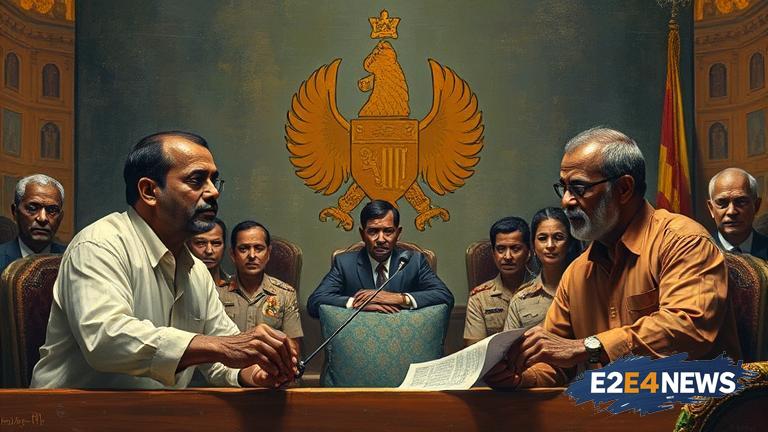Sri Lanka has been grappling with a plethora of issues related to its judiciary, with many questioning the integrity and impartiality of the justice system. The recent allegations of corruption and bias within the judiciary have sparked widespread concern and debate. The country’s history of political interference in the judiciary has led to a lack of trust in the system, with many believing that the guilty are often able to manipulate the law to their advantage. The judiciary’s inability to hold those in power accountable has resulted in a culture of impunity, where the powerful are able to act with reckless abandon. The lack of transparency and accountability within the judiciary has further exacerbated the problem, making it difficult to track the progress of cases and ensure that justice is served. The role of the Attorney General’s Department has also been called into question, with many alleging that it has failed to prosecute cases effectively. The department’s inability to secure convictions in high-profile cases has led to a loss of public confidence in the justice system. Furthermore, the judiciary’s reliance on outdated laws and procedures has hindered its ability to adapt to the changing needs of the country. The lack of resources and infrastructure has also impeded the judiciary’s ability to function effectively, leading to lengthy delays and backlogs in the system. In addition, the judiciary’s failure to protect the rights of marginalized communities has raised concerns about its commitment to upholding the rule of law. The recent appointment of a new Chief Justice has raised hopes that the judiciary will undergo reforms and become more accountable. However, many are skeptical about the ability of the new Chief Justice to effect meaningful change, given the entrenched nature of the problems within the judiciary. The international community has also expressed concern about the state of Sri Lanka’s judiciary, with many calling for reforms to ensure that the justice system is fair and impartial. The European Union has threatened to withdraw trade concessions if Sri Lanka fails to implement reforms and ensure that the judiciary is independent and impartial. The United States has also expressed concern about the state of Sri Lanka’s judiciary, with the State Department calling for reforms to ensure that the justice system is fair and transparent. Despite the challenges facing the judiciary, there are many who believe that reform is possible. The establishment of a new judicial commission has raised hopes that the judiciary will become more accountable and transparent. The commission’s mandate to investigate allegations of corruption and misconduct within the judiciary has been welcomed by many, who see it as a step towards reform. However, others are skeptical about the commission’s ability to effect meaningful change, given the lack of resources and infrastructure. The role of civil society organizations has been crucial in highlighting the issues facing the judiciary and calling for reform. Many organizations have been working tirelessly to promote transparency and accountability within the judiciary, and to ensure that the justice system is fair and impartial. The media has also played a crucial role in highlighting the issues facing the judiciary, with many journalists risking their lives to expose corruption and misconduct. Despite the challenges facing the judiciary, there are many who believe that Sri Lanka has the potential to develop a fair and impartial justice system. With the support of the international community and the efforts of civil society organizations, it is possible to reform the judiciary and ensure that the guilty are held accountable. However, this will require a concerted effort from all stakeholders, including the government, the judiciary, and civil society. The road to reform will be long and difficult, but it is a necessary step towards ensuring that justice is served and that the rule of law is upheld. Ultimately, the fate of Sri Lanka’s judiciary will depend on the ability of its leaders to prioritize reform and ensure that the justice system is fair, transparent, and accountable. The country’s future depends on it, and the international community will be watching closely to see if Sri Lanka is able to rise to the challenge.
